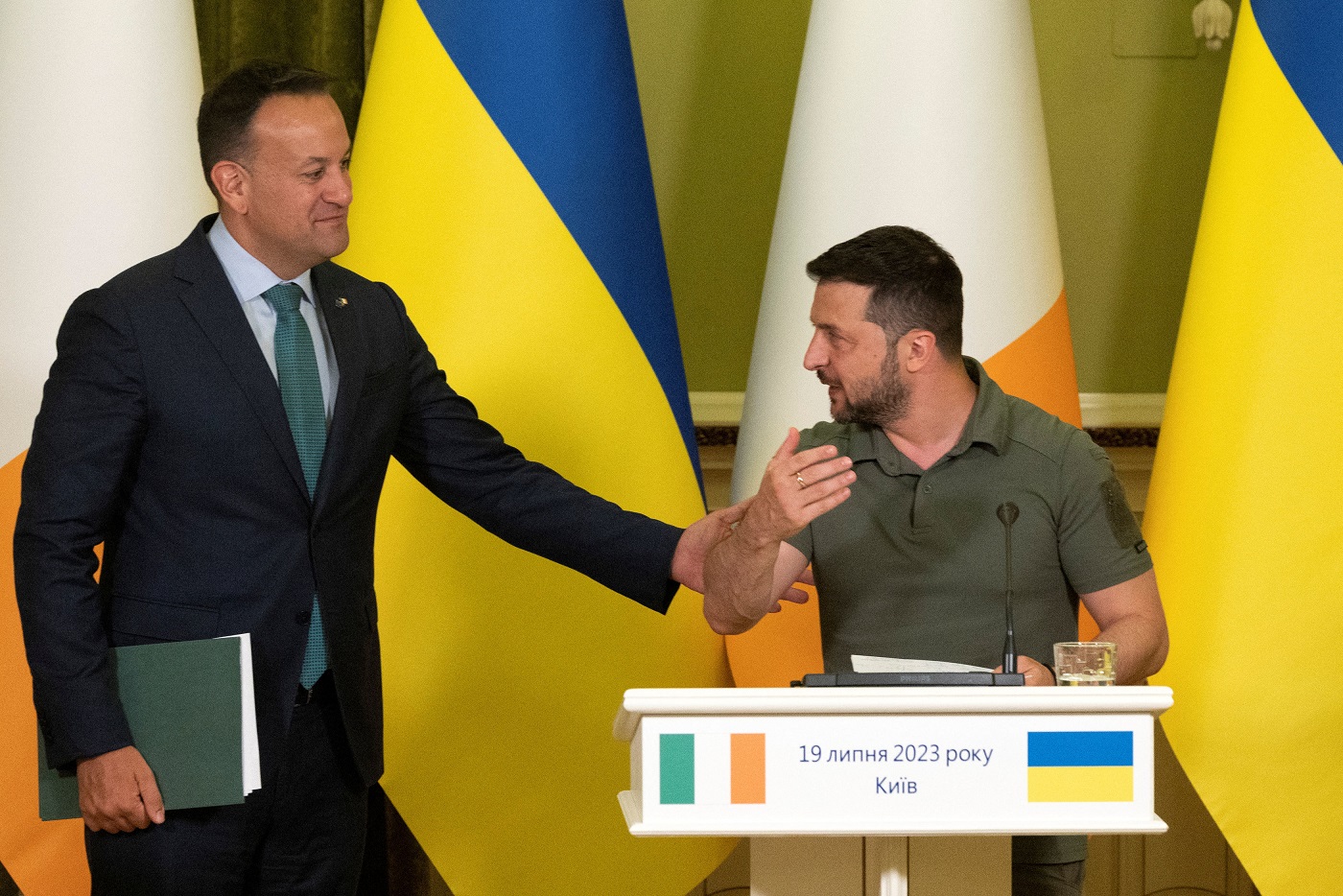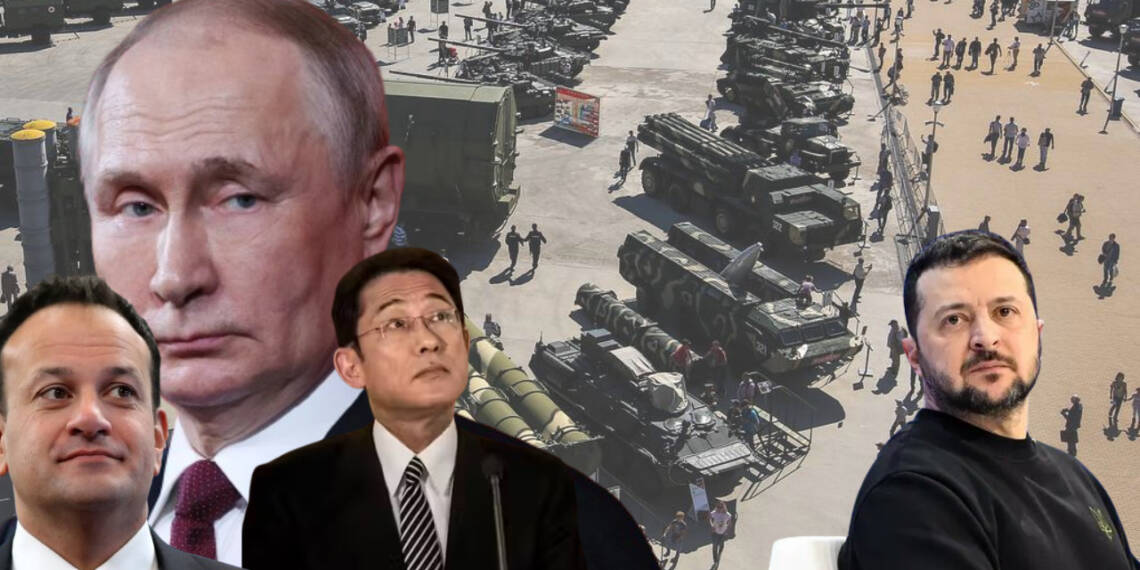Ever wondered about the hidden passports of Russia’s missiles? Enter Ukraine’s sleuths at the Kyiv Scientific Research Institute of Forensic Expertise. With microscopes and screwdrivers, they’ve unmasked an unexpected cast: Irish carburettors and Japanese lenses in Russian drones. Who knew missiles had such well-stamped travel logs?
Housed within metal-walled cabins, forensic analysis experts in Kyiv’s Scientific Research Institute of Forensic Expertise delve into the remnants of recent attacks with microscopes, screwdrivers, and computers.
Their meticulous examination seeks to confirm suspicions that, despite stringent sanctions, Russia relies on imported components for its assaults on Ukraine. Adorning the institute’s courtyard are dozens of missiles, shells, and drones, softly covered in snow, forming an eerie tableau of conflict aftermath.
These specialists operate on the front lines of investigation, unraveling the complex story hidden within debris, shedding light on the international dynamics at play in the ongoing conflict.
Join us on Telegram: https://t.me/tfiglobal
Comprising primarily former military engineers, these researchers in Kyiv’s Scientific Research Institute of Forensic Expertise exhibit a remarkable ability to identify globally sourced components despite the challenges posed by stringent sanctions on Russia’s technology imports.
In a compelling demonstration for AFP journalists, they showcased a Russian drone carburettor boldly stamped “Made in Ireland” and Japanese camera lenses extracted from a Russian Kartograf reconnaissance drone.

Notably, expert Oleksiy dismissed Russia’s attempts to erase foreign markings, stating, “It doesn’t matter, basically. How do you hide it? If there are thousands of these microchips, if they wipe off a few of them, what difference does it make?”
This revelation underscores a vulnerability that the Ukrainian government actively documents on its “War & Sanctions” website. This comprehensive database meticulously traces the origins of components found in Russian weaponry to over 30 countries, illuminating the global network contributing to Russia’s military capabilities. The institute’s meticulous work not only exposes the intricacies of Russia’s sourcing but also reinforces the significance of international collaboration in addressing the challenges posed by modern warfare.
Read More: Europe’s Economic Hide-and-Seek with Russia and the Third-Party Gains
Now let’s find out: which countries have been supplying weapons to Russia all this while?
Oleksiy stressed the imperative of maintaining “constant pressure” to thwart Russia’s acquisition of microelectronics designed for civilian purposes, pointing to implicated countries such as China, Kazakhstan, and Turkey.
It was just recently when the EU pointed fingers at Chinese suppliers for aiding Russia’s war efforts, threatening to expose over a dozen companies at its summit. However, the blame extends to the West, where major tech companies play a pivotal role in sustaining Russia’s arsenal.
Intel, AMD, Texas Instruments, and IBM are named contributors, with their microprocessors powering Kalibr missiles. Despite Western sanctions having a temporary impact, Russian imports of critical components have rebounded, indicating successful supply chain reconfigurations with China, Hong Kong, Kazakhstan, and Turkey.
Despite Western sanctions following Russia’s invasion, Moscow, with assistance from China, Hong Kong, Kazakhstan, and Turkey, has effectively reconfigured supply chains. Western companies contribute to the “dual-use” game, providing technology repurposed for military use, exemplified by Garmin GPS devices and satellite phones. The West’s hypocrisy is evident as it blames China while ignoring its own complicity. Sanctions, likened to a leaky sieve, allow critical components to flow into Russia through backchannels.
A recent report from Kyiv’s KSE Institute and the Yermak-McFaul international working group reiterated concerns about Russia’s ongoing capability to import essential goods for military production.
In January, the United States officially declared that North Korea, a close ally of Russia, supplied Moscow with missiles used in attacks on Ukraine. While Kyiv has yet to confirm this assertion, the institute’s team awaits fragments of the suspected North Korean missiles, highlighting the potential ease with which North Korea could supply Russia through their shared land border.
Some time back, the Guardian reported US intelligence officials believe that the Russians could look to purchase additional North Korean military equipment in the future.
Last year, North Korea became the third country on the planet, after Russia and Syria, to formally recognize Luhansk and Donetsk as independent nations. The country has also shown interest in sending labourers to help Russia rebuild Ukrainian territories under Russian control. Back then Moscow signed a million-dollar defence deal with Pyongyang. Russia was getting a cushion from North Korea, along with Iran and Kazakhstan, to shore up its weaponry stockpile.
Well not just North Korea or China or Japan but Irish firms have also been accused of helping bring microchips into Russia to be used in military hardware.

Amideon Systems Ltd, an Irish tech company, is accused of playing a crucial role in an international smuggling network that delivered microchips to Russia for military use, circumventing sanctions. The company, founded by the Sugrue brothers, allegedly acted as a key middleman, transferring technology from the French manufacturer Ommic to a Russian firm linked to the state defense industry.
The components were mostly shipped through Amideon’s UAE-based subsidiary Amideon FZC to Fly Bridge, a Moscow-based company. Fly Bridge acquired the technology on behalf of Istok, a Russian state-owned company that makes electronic warfare systems for the Russian military.
Fly Bridge was founded by Maksim Ermakov, who has recently been placed under sanctions by the US and UK governments.
The relationship between the companies continued following Russia’s military operation of Crimea in 2014 and the stepping up of western sanctions in response, which included a ban on the sale of sensitive components that could have military applications.
The French authorities believe the export of the microchips through a circuitous international network was aimed at circumventing controls designed to prevent military technology falling into the hands of France’s adversaries.
Customs documents show shipments through Amideon ceased in 2018. However, according to the Financial Times, Marc Rocchi, the director general of Ommic, told prosecutors that Amideon remained involved until 2021, shortly before Russia launched its military operation in Ukraine.
Coming to recent revelations by the Kyiv’s Scientific Research Institute, they accentuate the intricate web of international cooperation facilitating Russia’s military capabilities.
These specialists have seen indications of a drop in missile quality while actively monitoring missile attack sites in Kyiv.
The chief of the military research laboratory, Andriy Kulchitskyi, a 68-year-old former high-ranking military sapper, voiced concerns about the latest Russian missile barrages targeting Ukrainian cities, pointing out a decline in accuracy.
Read More: How Private Companies in the US helped Russia beat Ukraine
“What we see from their use of their so-called high-precision weapons… [is that] accuracy is missing. It’s not necessarily linked to a lack of components. They [Russia] have them. But if they specify an accuracy of seven to 10 metres and it strikes 50-100 metres away, that already means there are production problems in the Russian industry, bad missiles.”
The specialists at the Kyiv Institute assemble their results in response to requests for investigations, which are then presented in court. Their findings are sent to international courts looking into possible war crimes in cases involving civilian fatalities.
Amidst all this one thing is certain, while the West slapped sanctions on Russia, they inadvertently aided Russia’s war machine against Ukraine. The seemingly united front begins to crack as critics highlight potential loopholes and unintended consequences in the economic restrictions.
Watch More:








